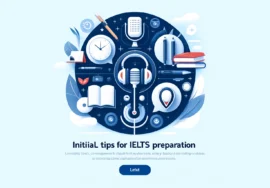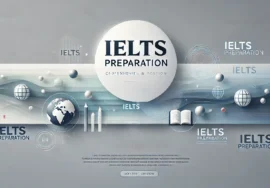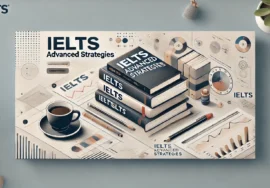
Dodge the Detours: Navigating Common IELTS Mistakes for a Smoother Ride
The IELTS exam is not just a test; it’s a gateway to academic, professional, and personal growth. Yet, many candidates stumble along the way, often due to avoidable mistakes. Whether it’s overcomplicating the Writing task, losing focus in Listening, or panicking during the Speaking test, these missteps can significantly impact your overall band score.
In this article, we’ll uncover the most common IELTS mistakes and guide you with actionable tips to navigate them smoothly. With proper preparation and a strategic mindset, you can steer clear of these detours and ensure a smooth ride to your dream IELTS score.
Table of Contents
- Understanding the Common Pitfalls
- Listening Section: Stay Sharp and Focused
- Reading Section: Don’t Skim Too Fast
- Writing Section: Clarity Over Complexity
- Speaking Section: Speak with Confidence, Not Perfection
- General Tips to Avoid Test-Day Mistakes
- Conclusion: Your Path to IELTS Success
1. Understanding the Common Pitfalls

Mistakes in IELTS often stem from:
- Lack of familiarity with the test format.
- Mismanagement of time.
- Overthinking or underpreparing.
By recognizing these patterns, you can prepare smarter, not harder.
Key Insight: Always practice under real exam conditions. Simulate the timing, pressure, and environment to build resilience and confidence.
2. Listening Section: Stay Sharp and Focused

Mistake #1: Losing Track of the Audio
Many candidates lose focus during the Listening section, especially when unfamiliar terms or phrases are mentioned.
Solution:
- Practice active listening daily by using podcasts or audiobooks.
- Familiarize yourself with accents (British, Australian, Canadian).
Mistake #2: Writing Before Understanding
Jumping to conclusions or jotting down answers too soon can lead to errors.
Solution:
- Listen for keywords but wait for the speaker to complete the context.
- Use the 30-second review time to double-check your answers.
Pro Tip: Use Cambridge IELTS practice tests to master audio comprehension.
3. Reading Section: Don’t Skim Too Fast

Mistake #1: Skipping Keywords
Candidates often rush through the passage, missing key details.
Solution:
- Practice skimming for the main idea and scanning for specific details.
- Highlight or underline keywords as you read.
Mistake #2: Misinterpreting True/False/Not Given Questions
This question type confuses many test-takers.
Solution:
- “True” means the statement agrees with the passage.
- “False” contradicts the passage.
- “Not Given” means there’s no information.
Visual Aid: Below is a sample table to clarify True/False/Not Given logic.
| Statement | Passage Information | Answer |
|---|---|---|
| Matches exactly | Yes | True |
| Contradicts information | No | False |
| Not mentioned explicitly | Unclear | Not Given |
4. Writing Section: Clarity Over Complexity

Mistake #1: Overusing Complex Vocabulary
Many candidates believe that using “big” words will impress the examiner.
Solution:
- Prioritize clarity over complexity.
- Use varied sentence structures but keep your vocabulary natural.
Mistake #2: Not Meeting Task Requirements
For both Task 1 and Task 2, missing key instructions can cost you marks.
Solution:
- Task 1: Focus on trends, comparisons, and data accuracy.
- Task 2: Answer all parts of the question directly.
Example: Below is a comparison of good vs. bad task responses:
| Bad Response | Good Response |
|---|---|
| Uses jargon without relevance | Explains with simple yet precise language |
| Ignores the word count and structure requirements | Meets word count and maintains proper introduction-body-conclusion |
5. Speaking Section: Speak with Confidence, Not Perfection

Mistake #1: Memorized Responses
Examiners can easily detect rote-learned answers, which can negatively impact your score.
Solution:
- Practice natural conversations around common topics.
- Use a variety of phrases to express ideas.
Mistake #2: Overthinking Grammar
Candidates often freeze while trying to perfect grammar mid-sentence.
Solution:
- Prioritize fluency over accuracy.
- Self-correct minor errors naturally without stopping.
Practice Activity: Record yourself answering a Speaking prompt, then analyze areas for improvement.
6. General Tips to Avoid Test-Day Mistakes
- Time Management:
- Allocate time wisely for each section.
- Use practice tests to build pacing skills.
- Mental Preparedness:
- Practice mindfulness to stay calm under pressure.
- Get adequate sleep the night before the test.
- Understanding Instructions:
- Read all instructions carefully.
- Don’t assume; confirm the rules of each section.
7. Conclusion: Your Path to IELTS Success
Achieving success in the IELTS exam requires more than just knowledge of the English language—it demands a well-thought-out strategy, consistent practice, and an understanding of common pitfalls. By identifying and addressing the typical mistakes candidates make, you can save time, boost confidence, and improve your overall performance.
Here’s a summary of the key takeaways:
- Listening: Stay sharp by actively listening to a variety of English accents and focusing on context rather than individual words.
- Practice mock tests and learn to utilize the 30-second review time effectively.
- Reading: Balance speed and comprehension by skimming for main ideas and scanning for details. Master question types like True/False/Not Given to avoid misinterpretations.
- Writing: Focus on clarity and relevance. Avoid the temptation to overuse complex vocabulary, and ensure you address all parts of the task to maximize your score.
- Speaking: Speak naturally and fluently, prioritizing communication over perfection. Practice with real-life scenarios to build confidence.
- General Tips: Manage your time wisely, stay calm under pressure, and always follow the instructions for each section of the test. Use mindfulness techniques or light exercise to alleviate stress before the exam day.
Building a Successful Mindset
Success in IELTS is not about avoiding mistakes altogether—it’s about learning from them. Remember, every practice session, every mock test, and even every mistake you make is a step toward improvement. Developing a growth mindset can turn setbacks into opportunities for growth.
Take Action Now
Your journey to IELTS success begins with the first step:
- Commit to a Study Plan: Set achievable goals and follow a structured preparation schedule.
- Use Reliable Resources: Access practice tests, attend workshops, or enroll in courses tailored to your needs.
- Seek Feedback: Whether from a teacher, a mentor, or even a peer, constructive feedback is invaluable.
Final Thought
Remember, the IELTS exam is a means to an end, whether it’s studying abroad, advancing your career, or starting a new life in another country. With the right preparation, determination, and mindset, you can overcome the challenges and achieve your desired band score.
Stay confident, believe in your abilities, and embrace the process. The smoother your preparation ride, the closer you’ll be to unlocking the opportunities that await on the other side. Good luck!
References
Below is a suggested list of credible sources to add to the article:
- Cambridge IELTS Practice Tests
Website: www.cambridgeenglish.org
Description: Offers official IELTS practice tests and study guides. - IELTS Official Website
Website: www.ielts.org
Description: The official platform for IELTS registration and resources. - BBC Learning English
Website: www.bbc.co.uk/learningenglish
Description: A resource for improving listening, vocabulary, and pronunciation. - The British Council
Website: www.britishcouncil.org
Description: Offers IELTS preparation materials and online resources. - IELTS Liz
Website: www.ieltsliz.com
Description: Provides free tips, lessons, and advice for IELTS candidates. - TED Talks for Listening Practice
Website: www.ted.com
Description: A platform for enhancing listening skills and building vocabulary. - Purdue Online Writing Lab (OWL)
Website: owl.purdue.edu
Description: A resource for improving academic writing and grammar. - Road to IELTS (British Council)
Website: learnenglish.britishcouncil.org
Description: A comprehensive course for IELTS preparation with mock tests and tutorials. - IELTS Simon
Website: www.ielts-simon.com
Description: Practical advice and sample answers for all IELTS sections. - Vocabulary.com
Website: www.vocabulary.com
Description: A tool for expanding your vocabulary and practicing usage.








